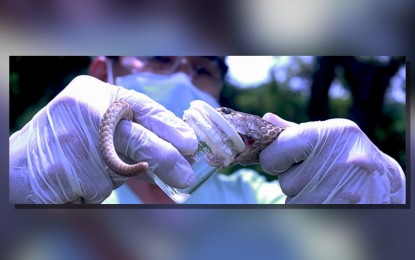
ANTI-VENOM. An expert of the Research Institute for Tropical Medicine extracts venom from a snake as part of the process to produce purified cobra anti-venom. The Department of Health regional office said providing anti-venom vaccines in provinces remains a big challenge due to limited stocks amid rising snake bite cases, an official said on Tuesday (July 2, 2024). (Photo courtesy of RITM)
TACLOBAN CITY – The Department of Health (DOH) regional office said providing anti-venom vaccines in provinces remains a big challenge due to limited stocks amid rising snake bite cases, an official said on Tuesday.
DOH Eastern Visayas Regional Director Exuperia Sabalberino said the DOH-Research Institute for Tropical Medicine (RITM) is the only manufacturer of anti-venom vaccines to supply the requirement nationwide.
“Their production is very limited. It’s not wise to produce a lot since the cost is high and the demand is only that low,” Sabalberino told reporters during the "Kapihan sa Bagong Pilipinas" here.
Each vial of an anti-venom is PHP3,000, she said.
She said during the extreme hot weather in April this year when snake bites were common, the region had only three vials of anti-venom vaccines stored at the Eastern Visayas Medical Center in this city.
The DOH is also working on storing anti-venom vials at Sogod District Hospital in Sogod, Southern Leyte, since it is closer to coastal towns in the province where snake bite cases are frequently reported.
“In April, a child in Southern Leyte died after being bitten by a poisonous snake since there are no available anti-venom vaccines in the area,” Sabalberino said.
In the region, the DOH has logged 486 snake bite cases in the past three years -- 168 cases in 2022; 226 cases in 2023; and 92 from January to April 2024. The DOH has recorded seven deaths in the past three years.
The antivenom available in the region is the polyvalent treatment, which is effective against the venom of three cobra species: King Cobra, Philippine Cobra, and the Samar Cobra.
Sabalberino said storing anti-venom in health centers is not feasible since it requires a trained medical professional to administer it to snakebite patients.
Administering anti-venom for snakebites is a specialized procedure that requires the expertise of toxicologists, according to the DOH.
The anti-venom is an antibody medicine that can disable a particular venom’s toxins. If injected quickly after a bite or sting, the antibodies neutralize the venom, potentially saving the victim’s life or limb. (PNA)
